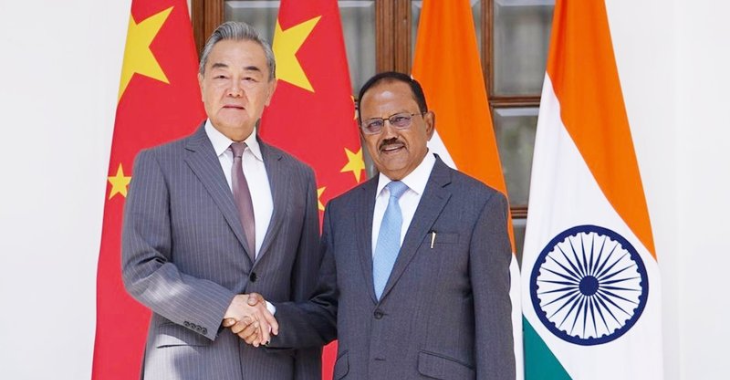Chinese Foreign Minister Wang Yi was hosted by National Security Advisor Ajit Doval for the 24th round of the Special Representatives’ dialogue on the India-China Boundary Question, a major diplomatic engagement intended to advance the long-pending boundary resolution and stabilize bilateral ties.
Following Wang Yi’s two-day official visit to India, where he also met with Prime Minister Narendra Modi and External Affairs Minister S. Jaishankar, the discussions took place on August 19.
Building on the leader-level agreement made at the October 2024 Kazan summit, the conversation signaled a new stage of interaction between the two Asian heavyweights.
Both parties emphasized the need to maintain this momentum in order to promote wider bilateral cooperation, acknowledging that peace and quiet had mainly prevailed along the Line of Actual Control (LAC) since the 23rd round of negotiations.
A five-point framework was agreed upon by Wang Yi and National Security Advisor Doval to improve collaboration and handle the intricate boundary problem.
In accordance with the 2005 Agreement on Political Parameters and Guiding Principles, they first reiterated the significance of approaching the boundary issue from a political perspective and working for a just and amicable resolution.
Second, in order to investigate “Early Harvest” chances in boundary delimitation—areas where consensus would be easier to reach—an Expert Group will be formed within the Working Mechanism for Consultation and Coordination (WMCC).
Third, to improve border management procedures and guarantee long-term peace along the border, a special Working Group will be established under the WMCC.
Fourth, the two parties decided to extend the General Level Mechanism (GLM) to the Eastern and Middle Sectors in addition to the Western Sector. The Western Sector will hold an early meeting to discuss progress and operationalize new measures.
Lastly, both countries agreed to start de-escalation talks by utilizing the diplomatic and military channels already in place, starting with the development of guiding principles and procedures.
The discussions were characterized as open and productive, demonstrating a common goal to put the past setbacks—such as the 2020 conflicts in the Galwan Valley—beyond and restore confidence via methodical discourse.
It is anticipated that China would host the next round of Special Representatives’ negotiations in 2026.
Read More
Today, the SC will consider appeals for the reinstatement of J&K’s statehood
Rajiv Pratap Rudy, a BJP MP, wins the Constitution Club election


